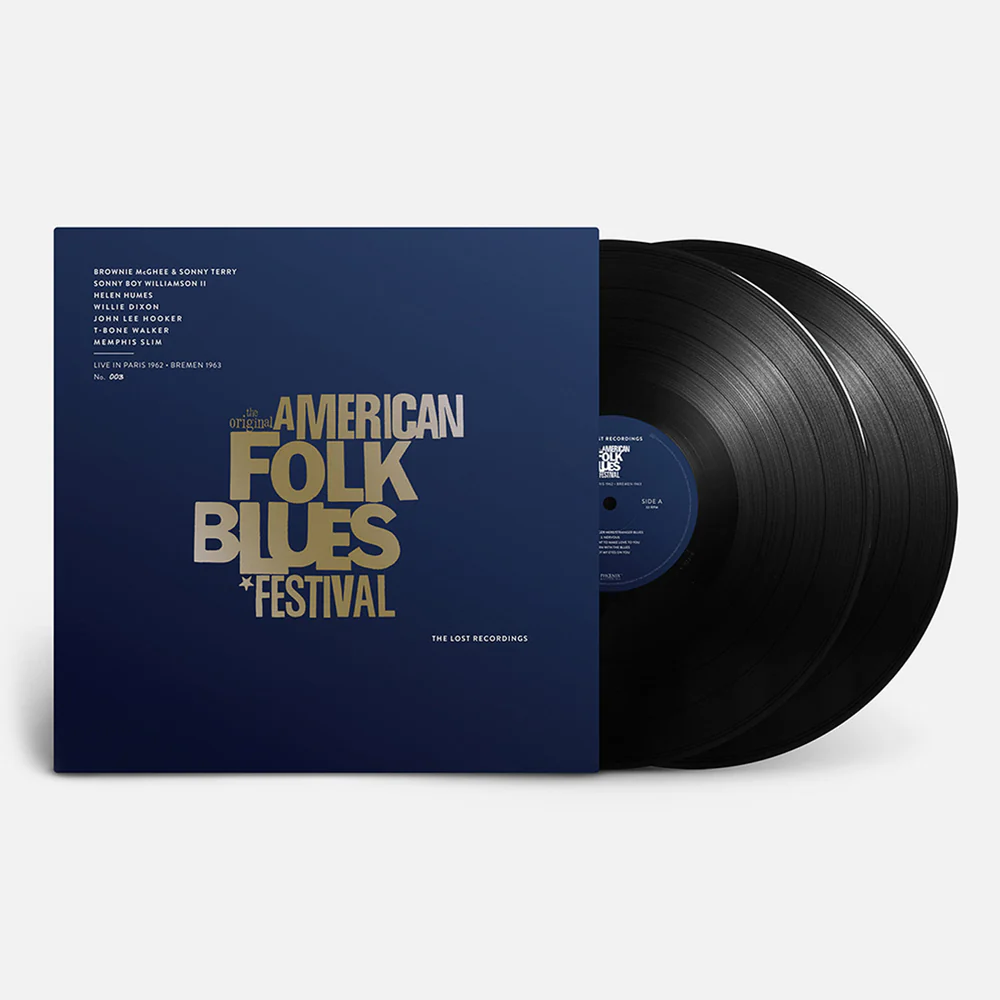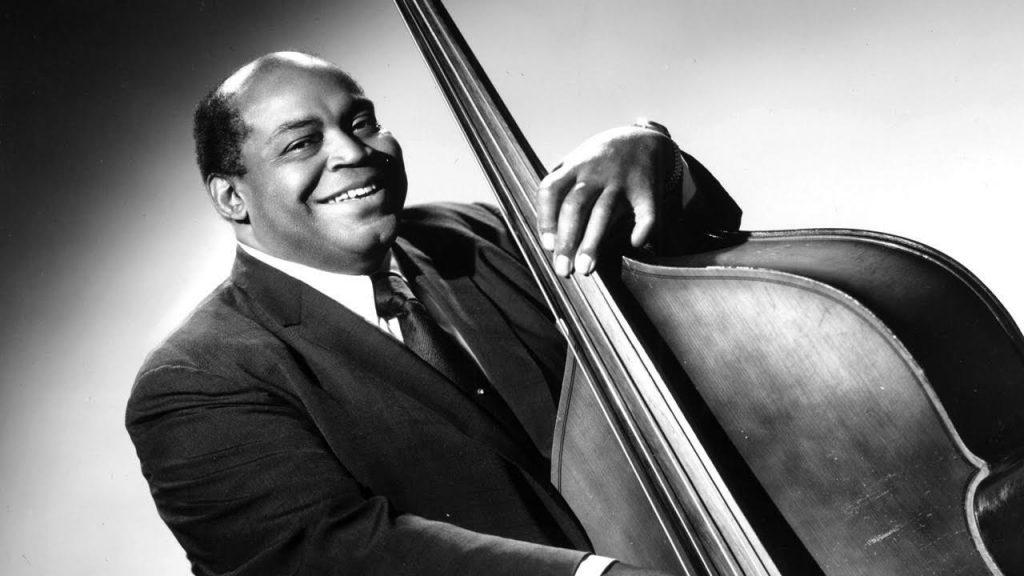The American Folk Blues Festival toured Europe initially as an annual event starting in 1962 and continued periodically until its final performance in 1985. These concerts introduced audiences to the leading blues performers of the day, mainly Black American musicians at their peak, most of whom had never previously appeared outside the USA. They contributed to the expansion of blues audiences across the pond where jazz had become popular and rock and roll was gaining a foothold.
Top UK music journalist Henry Yates sets the scene for this historic festival which he appropriately subtitled ‘God’s own festival bill rolls into Paris.’ He wrote, “When the inaugural American Folk Blues Festival touched down on the tarmac at Paris Airport on October 19, 1962, the cynicism in the air was palpable. Predictions were rife that when they played the Olympia Theatre the following night, the venue would either be empty or populated by jeering jazz purists. Furthermore the promoters, Horst Lippmann and Fritz Rau, were widely expected to take a financial kicking.” A year later the festival entourage traveled to Bremen, taking the blues boom of the early ‘60s into Germany. The previously lost tapes from these two seismic events were restored for this double vinyl limited edition.

According to the publicity burb from The Lost Recordings, the album “takes listeners on a journey through the authentic sound of the blues, traversing America’s history and foreshadowing its transformative impact on global music.” A five-star review from the French publication Le Journal du Dimanche concluded: “The restorations of The Lost Recordings are worthy of those devoted to master paintings.”
While the above sounds like hyperbole, this is by far the best quality sound recording this reviewer has heard in the last 25 years. Every note sung and played is crystal clear which sets it apart from many live albums. Reviewing the festival concert was like sitting in the front row of the venue, even to the extent of joining in the applause and the banter! The experience is priceless.
So how significant is this album? Many of the concerts were released on records and DVDs, which contributed to the blues being discovered in Europe through access to the most powerful and inspirational American blues artists. The festivals in the UK played an important part in the blues explosion that would lead to the ‘British Invasion’ of the USA. The Lost Recordings are exceptional because of their unique quality and the high caliber of the musicians.
The headliners are a who’s who of undisputed legends covering most styles of blues. The Piedmont style was represented by spectacular guitar picker Brownie McGhee and harp ace Sonny Terry. Mississippi born Sonny Boy Williamson II was given the moniker ‘King of the Harmonica’ by his peers including BB King. Although not quite a member of the pantheon of American chanteuses, Helen Humes was a versatile singer and former member of the Count Basie Orchestra. Double bassist and vocalist Willie Dixon was of course one of the most influential bluesmen of his generation.
The most apt description of John Lee Hooker came from the late JD Nash, American Blues Scene: “Known as the Boogie Man and the King of the Boogie, Hooker was a true blues superstar whose influence reaches into nearly every genre of music.” Multi-instrumentalist, singer and songwriter T-Bone Walker was a pioneer of blues electric guitar, famous for hits such as “Stormy Monday” while piano maestro Memphis Slim was another monumental figure in the blues annals.
Below is a track-by-track synopsis interspersed with video clips, the recording sounds of which will not be anything like the perfect audio quality of the record. However, they add authenticity and atmosphere to the production.
SIDE A:
- “ I’m a Stranger Here/Stranger Blues” – 4:15
This is a Brownie McGhee & Sonny Terry original classic both musically and lyrically, one of McGhee’s vocal masterpieces complete with whoopees and in perfect harmony with his partner.
Well, I’m goin’ back home, wear out ninety-nine pair of shoes
Oh yes, I am, I’m goin’ back home wear out ninety-nine pair of shoes
Well, when I get back home I won’t have these old stranger blues
2. “Nervous” – 4:26
Willie Dixon wrote this song and despite the faking of a nervous condition, he manages to make it quite humorous and self-deprecating. Memphis Slim’s flowing piano keys complement the pulsating melodic bass line. Willie first recorded ‘Nervous’ back in December 1959 long after he had left Mississippi for Chicago.
3. “I Just Want to Make Love to You” – 4:00
“There were no blues until there were women” declares Willie before the duo play this blues song penned by Dixon but embellished by Slim’s supremo solos. In 1954 it had been recorded by Muddy Waters and became a best-selling single.
4. “Born With the Blues” – 3:51
One superb upbeat song written and performed by Sonny and Brownie, the latter singing at his very best over some tasty harp work.
5. “I Got My Eyes on You” – 3:07
The duo presents a theme centered around love, obsession, and the complexities of relationships with an impassioned vocal delivery from McGhee.
SIDE B:
6. “John Henry” – 5:59
An intricate harp introduction from Sonny Terry prefaces this brilliant representation of a well-known traditional folk song which requires no introduction.
7. “I Need Money” – 2:12
This and the next three tracks feature John Lee Hooker performing solo, this one written by Berry and Janie Bradford and famously covered by The Beatles in 1963. Hooker picks out the melody with his guitar in contrast to his usual style.
8. “Everyday, I Have the Blues” – 4:30
More typical staccato vocals and strings reminiscent of the version on the Hooker and the Hog album when Tony McPhee and the Groundhogs first played with John Lee Hooker in June 1964.
9. “Night Time Is the Right Time” – 3:33
A haunting, moody love song from Hooker, first recorded in 1937 by Roosevelt Sykes.
10. “My Own Fault” – 5:05
A sensational Hooker song released in 1954, the tension mounting, the audience mesmerized as the depths of the blues are explored.
SIDE C:
This side of the second LP is an electric band set
- Baby, Won’t You Please Come Home “ – 2:35
Written by Clarence Williams and Charles Warfield and covered by many musicians this has become a jazz standard. The first hit version was Bessie Smith’s 1923 recording which stayed in the charts for four weeks. Helen Humes proves she is a consummate jazz singer.
- “Moanin’” – 1:55
The composer Robert ‘Bobby’ Timmons was an American jazz pianist and composer. He was a sideman in Art Blakey’s Jazz Messengers. This instrumental showcases the immense talents of Davor Kajfes on piano and T-Bone Walker’s guitar.
- “Money Honey” – 2:06
The song was written by Jesse Stone and was first recorded and released by Clyde McPhatter & The Drifters in 1953. Helen transforms into a high-energy blues shouter
- “Kansas City” – 2:34
Friends from schooldays, Jerry Leiber and Mike Stoller penned one of the most-recorded tunes in rock and roll history. Humes sets the pace alongside Dixon’s bass and Jackson’s driving percussion.
Helen Humes (vocals), Davor Kajfes (piano), T-Bone Walker (guitar), Willie Dixon (bass), Jump Jackson (drums)
- “Bye Bye Baby” – 6:11
Writing credits go to Peter Chatman aka Memphis Slim one of the all time great blues pianists with his unique style. Chicago blues singer, songwriter and harmonica player ‘Shakey Jake’ Harris, the uncle of Magic Sam, takes the lead on this track.
- Medley – 6:09
“The Blues Ain’t Nothin’ But a Woman”
Written by Helen Humes who makes it her tour de force by taking advantage of the illustrious company she keeps in this all star line-up.
“Bye Bye Baby” by Peter Chatman concludes this set.
Helen Humes (vocals), Shakey Jake (vocals & harmonica), Memphis Slim (vocals & piano), John Lee Hooker (vocals), Sonny Terry (vocals & harmonica), Brownie McGhee (vocals & guitar), T-Bone Walker (guitar), Willie Dixon (vocals & bass), Jump Jackson (drums)
SIDE D:
This side, recorded in Bremen, belongs mainly to Sonny Boy Williamson ll and his band. He had already established a reputation as a master storyteller, this track-listing choice showcasing his abilities perfectly. Three of these songs are from his emblematic Down and Out Blues which remains one of the genre’s most acclaimed albums.
- “Eyesight to the Blind” – 3:35
A slow, intense 12-bar blues song written and recorded in 1951 by Sonny Boy Williamson II sets the scene for the finale to this historic concert.
- “Your Funeral & My Trial” – 3:00
Not all love songs are tender but the lyrics, “If you can’t treat me no better / It’s gonna be your funeral and my trial,” offer a glimpse into a particularly dismal relationship. If you happen to cross Sonny Boy there’s a fair chance he’d get you back real good!
- “Bye Bye Bird” – 4:10
Fortunately the mood lightens with a harmonica-driven blues song written by Willie Dixon and Sonny Boy. In 1963, Checker Records issued it as the B-side of Williamson’s single “Help Me,” which was his last single to reach the record charts.
- “Fattening Frogs for Snakes” – 3:45
The song title “Fattening Frogs for Snakes” seemingly refers to an old American proverb about putting loads of energy into something and not reaping the benefits. Memphis Slim’s keys are the perfect foil to Matt Murphy’s guitar licks.
11. “Bye Bye Blues” – 1:51
Sonny influenced all the young rock groups of the ‘60s, from the Allman Brothers to Led Zeppelin. This track is proof enough that this man embodied all of the greatest characteristics of the blues–from gut-wrenching soul to raw, badass musicianship.
Sonny Boy Williamson (vocals, harmonica), Memphis Slim (piano, vocals), Matt “Guitar” Murphy (guitar), Bill Stepney (drums)
12. “Wake Up Baby” – 4:26
This classic was recorded in Paris, 1964 and demonstrates a softer more conciliatory side to Sonny Boy supported by the elegant contributions from Sunnyland Slim and Hubert Sumlin.
Sonny Boy Williamson II (vocals, harmonica), Sunnyland Slim (piano), Hubert Sumlin (guitar), Willie Dixon (bass), Clifton James (drums)
Recorded in Paris, France on 20.X.1962, the Olympia
*Recorded in Bremen, Germany on 10.XI.1963, Stadttheater Bremerhaven
** Recorded in Paris, France in1964, the Olympia
Credits:
33rpm Lacquer-cuts: Kevin Gray
Photo: © Jean-Pierre Leloir
MONO ℗ 1962, 1964 Europe 1/SongMachine
MONO ℗ 1963 OneGate/Radio Bremen
Remastered by ℗ & © 2025 THE LOST RECORDINGS
Pressed by Simon Garcia, Marciac


